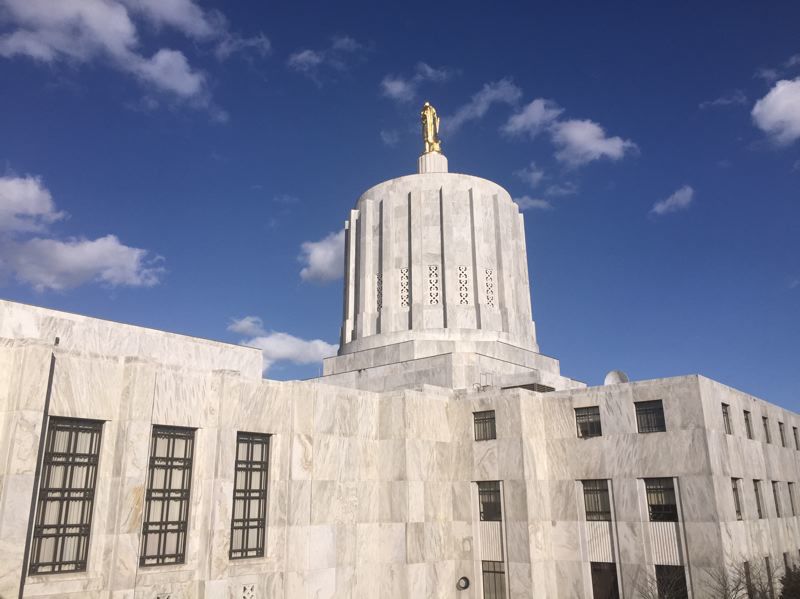List grows longer for Oregon lawmakers’ special session
Published 9:43 am Wednesday, December 9, 2020

- OREGON CAPITAL INSIDER - The Oregon Capitol building in Salem
The to-do list is growing for the Oregon Legislature as lawmakers consider a third special session this year, barely a month before the 2021 regular session gets under way on Jan. 11.
While most attention has focused on another extension of the moratorium on residential evictions set to expire on Dec. 31 (for Multnomah County, Jan. 8), lawmakers are looking at drafts of other proposed legislation.
Legislative leaders and Gov. Kate Brown have said they are open to a session. But they have not yet agreed on what should be considered, when the session would take place and whether they should invoke the “catastrophic disaster” provision to do so. That provision has never been used since voters approved it in 2012. It would allow lawmakers to convene without having to come to the Capitol in Salem — but it also imposes other requirements.
Also, December special sessions are rare, although then-Gov. John Kitzhaber convened a one-day session in 2012 for a tax break to enable sportswear giant Nike to keep its world headquarters outside Beaverton. (A 1963 special session ran from Nov. 11 through Dec. 2, although lawmakers took a nine-day break after the death of President John F. Kennedy.)
The list was made available by the office of House Speaker Tina Kotek, D-Portland, whose spokesman said that drafts also were being made available to senators.
The Stable Homes for Oregon Families coalition has pressed for a special session to extend the moratorium, which would be part of a broader proposal to couple it with a new state fund to compensate landlords for part of their lost income. Tenants would still have to pay rent owed by the new date of July 1 and certify that they are unable to pay as a result of the coronavirus pandemic and the economic downturn.
House and Senate Democrats disagree about the proposal put forth by the House Committee on Housing, which heard the proposal from a work group on Nov. 30. The proposed fund would require lawmakers to draw $100 million, probably from the projected ending balance in the 2019-21 budget.
“It is a well-vetted solution that has come forward as a result of the work group that would ensure $100 million is ready to go out into Oregon communities and help landlords and tenants within a short turnaround,” Sybil Hebb, director of advocacy for the Oregon Law Center, said at a virtual news conference Dec. 4. “This proposal will provide stability for tenants to get past this cliff that will happen in January if we do not act.”
Advocates for some landlord groups want lawmakers to approve tax credits, which are subtracted directly from taxes owed, to offset losses in rental income. Hebb said such proposals can be discussed in the 2021 session.
A separate proposal would extend the moratorium on property foreclosures from Dec. 31 to July 1.
Brown issued executive orders on both matters in March after the start of the pandemic, and lawmakers passed bills in subsequent special sessions.
But they are among several draft bills and concepts being circulated among lawmakers. The others, in no particular order:
• Disconnect Oregon’s tax code from some federal tax breaks for businesses included in the $2.2 trillion CARES Act, which Congress passed in March. The state legislation would limit the amounts businesses could deduct for excess losses and net operating losses, among others, to save money for state coffers. Business groups have opposed the bill, which was readied for but not advanced to an Aug. 10 special session.
• Authorize the state to form an emergency stockpile, such as personal protection equipment and testing kits for communicable diseases.
• Allow bars to sell cocktails to-go in sealed containers, akin to beer and wine that are permitted.
• Allow frontline health care providers to share public health data.
• Provide a limited liability shield for schools and related programs against lawsuits stemming from COVID-19 infections if the district follows rules in effect during the public health emergency going back to March 8 of this year. The shield does not affect other types of lawsuits, such as those alleging discrimination, and would expire when the governor declares an end to the emergency.
A couple of agencies also have requested legislation for consideration during the special session, although no drafts were made available yet.
• DMV: A moratorium on enforcement of expired Driver and Motor Vehicle (DMV) Services Division documents — licenses, permits and vehicle registration — is scheduled to end on Dec. 31. The Department of Transportation, DMV’s parent agency, seeks to extend the moratorium and make two other changes affecting in-person service at DMV offices.
• Employment Department: The agency seeks a technical change to allow it to tap its fraud control fund, instead of other funds that go for operations, to repay the Federal Emergency Management Agency for any benefit overpayments made under the Lost Wages Assistance program. That program drew $44 billion from FEMA’s disaster assistance money to extend extra unemployment benefits of $300 per week in 49 states, including Oregon, for five weeks ending Sept. 5. Oregon paid out a total of $363 million under this program.





